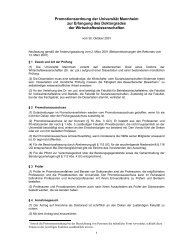The returns to cognitive and non-cognitive abilities in Germany
The returns to cognitive and non-cognitive abilities in Germany
The returns to cognitive and non-cognitive abilities in Germany
You also want an ePaper? Increase the reach of your titles
YUMPU automatically turns print PDFs into web optimized ePapers that Google loves.
Us<strong>in</strong>g the LOC scale, Osborne Groves (2005) show that the earn<strong>in</strong>gs of US females is<br />
negatively related <strong>to</strong> externality <strong>and</strong> that aggression <strong>and</strong> withdrawal negatively affects the<br />
wages of British women. At the same time, <strong>cognitive</strong> <strong>abilities</strong> are positively associated with<br />
the earn<strong>in</strong>gs of women <strong>in</strong> the US but not for women <strong>in</strong> the UK, once personality traits are<br />
<strong>in</strong>cluded <strong>in</strong> the model.<br />
<strong>The</strong> results of Mueller <strong>and</strong> Plug (2006), who use data from the Wiscons<strong>in</strong><br />
Longitud<strong>in</strong>al Study (WLS), <strong>in</strong>dicate that <strong>non</strong>-agreeableness, openness, <strong>and</strong> <strong>to</strong> a somewhat<br />
lesser extent emotional stability are positively related <strong>to</strong> men’s earn<strong>in</strong>gs. Furthermore,<br />
women receive a wage premium for be<strong>in</strong>g more conscientious <strong>and</strong> open. <strong>The</strong>ir f<strong>in</strong>d<strong>in</strong>gs also<br />
suggest that <strong>returns</strong> <strong>to</strong> <strong>non</strong>-agreeableness or, as they put it, antagonism are quite different for<br />
males <strong>and</strong> females. <strong>The</strong>y further account for <strong>cognitive</strong> skills <strong>in</strong>clud<strong>in</strong>g test scores from the<br />
Henmon-Nelson Test of Mental Ability which is a measure of general <strong>in</strong>telligence. Across<br />
all specifications, their estimates <strong>in</strong>dicate a positive l<strong>in</strong>ear relationship between <strong>in</strong>telligence<br />
<strong>and</strong> earn<strong>in</strong>gs.<br />
Cebi (2007) uses the Rotter-scale <strong>and</strong> achievement test scores from the AFQT<br />
provided by the NLSY <strong>to</strong> analyze the determ<strong>in</strong>ants of education as well as of labor market<br />
outcomes for men <strong>and</strong> women <strong>in</strong> the US. While she f<strong>in</strong>ds that educational outcomes are not<br />
significantly determ<strong>in</strong>ed by LOC once <strong>cognitive</strong> ability scores are <strong>in</strong>cluded, her results show<br />
that <strong>in</strong>ternal LOC is rewarded <strong>in</strong> the labor market. She concludes that “… locus of control is<br />
<strong>in</strong> fact captur<strong>in</strong>g a dist<strong>in</strong>ct aspect of ability not related <strong>to</strong> <strong>cognitive</strong> ability as measured by the<br />
AFQT.” (Cebi, 2007, p. 930).<br />
<strong>The</strong> NLSY is also used by Heckman et al. (2006) whose study relies on measures of<br />
LOC <strong>and</strong> self-esteem, <strong>and</strong> on achievement test scores from the AFQT <strong>in</strong> order <strong>to</strong> analyze the<br />
determ<strong>in</strong>ants of educational <strong>and</strong> labor market outcomes, <strong>and</strong> <strong>to</strong> expla<strong>in</strong> risky behavior of<br />
young adults. <strong>The</strong>y f<strong>in</strong>d evidence that both <strong>cognitive</strong> <strong>and</strong> <strong>non</strong>-<strong>cognitive</strong> skills are important<br />
10















